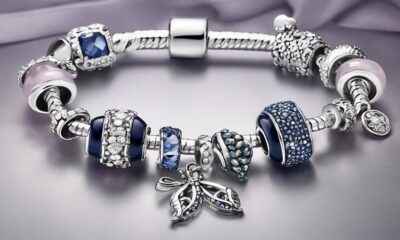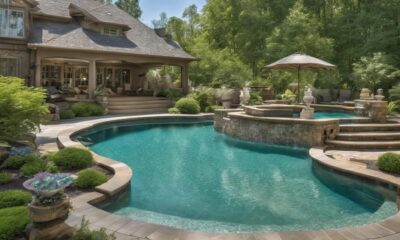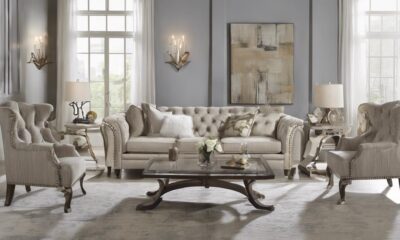Decor
Why Do Orthodox Churches Look Different?
2025
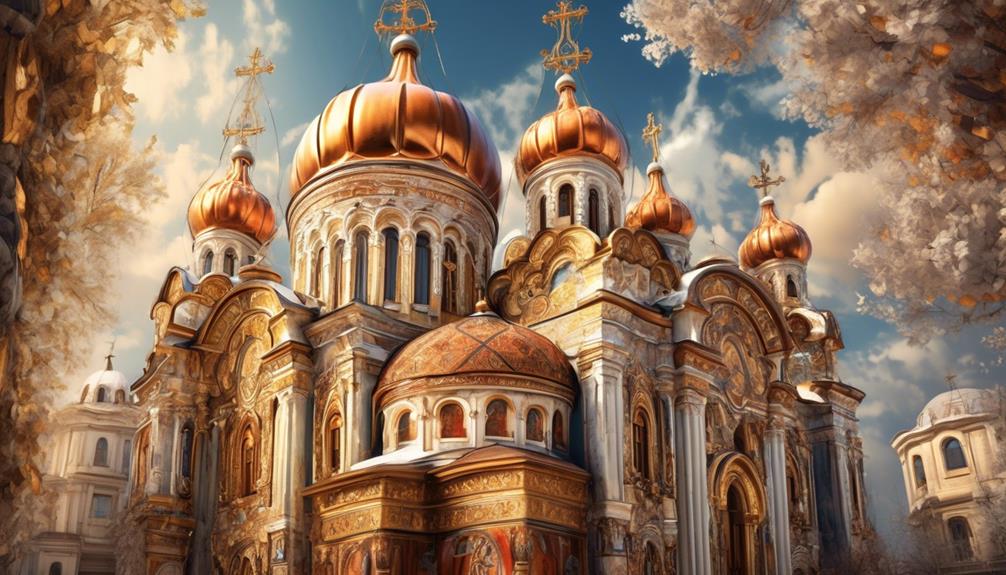
Have you ever pondered why Orthodox churches seem to have been crafted by someone with a fascination for onion domes and detailed iconography?
Well, the answer might surprise you. The architectural and decorative elements of Orthodox churches are steeped in centuries of tradition and symbolism, reflecting a rich tapestry of cultural, historical, and religious influences.
So, if you've ever found yourself captivated by the unique appearance of Orthodox churches, get ready to uncover the fascinating reasons behind their distinct design.
Key Takeaways
- Orthodox churches have a unique appearance that combines Roman, Byzantine, and local architectural styles, reflecting a fusion of different influences.
- The architectural elements of Orthodox churches include domes, post-and-beam structures, rounded arches, and ornate artwork such as iconography, mosaics, and frescoes.
- Iconography in Orthodox churches plays a central role in conveying religious symbolism and guiding worshippers in their faith journey.
- The appearance of Orthodox churches reflects a deep-rooted heritage, incorporating local design elements, materials, and cultural practices, while also evolving over time with the incorporation of contemporary design principles and construction techniques.
Historical Influences on Orthodox Church Design
The historical influences on Orthodox church design can be traced back to the early Christian period, where a fusion of Roman, Byzantine, and local architectural styles laid the foundation for the distinctive features seen in Orthodox churches today.
The Byzantine influence is particularly evident in the use of domes, iconography, and intricate mosaics, reflecting the grandeur and spirituality of the Eastern Roman Empire.
Additionally, Russian tradition has also played a significant role in shaping Orthodox church design, with its emphasis on onion domes, vibrant colors, and ornate iconostases.
These influences combine to create a sense of sacred beauty and spiritual reverence within Orthodox churches, inviting worshippers to experience a profound connection with the divine.
Understanding these historical influences allows for a deeper appreciation of the rich architectural heritage that continues to inspire and uplift those who enter these sacred spaces.
Architectural Elements of Orthodox Churches
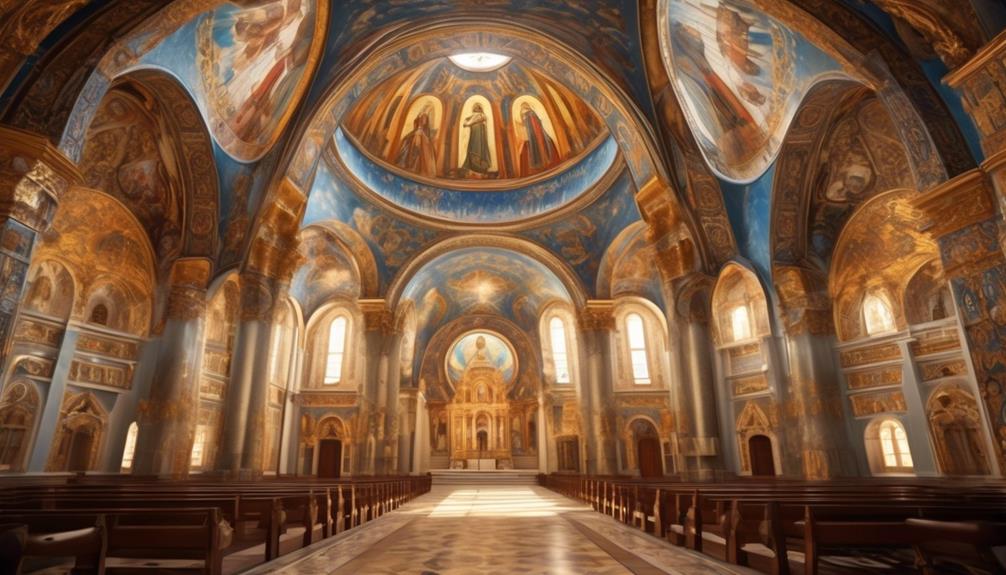
In Orthodox church architecture, the domes play a significant role in defining the visual identity of the structure. The construction techniques and decorative elements used in Orthodox churches are integral to their unique appearance. Here is a breakdown of the key architectural elements:
| Construction Techniques | Decorative Elements |
|---|---|
| Byzantine Architecture | Iconography |
| Post-and-Beam Structure | Mosaic Art |
| Timber Framing | Frescoes |
| Brick and Stone Masonry | Carved Woodwork |
| Cross-in-Square Plan | Ornate Metalwork |
Byzantine architecture, characterized by its domes and rounded arches, is a hallmark of Orthodox church construction. The intricate iconography, mosaic art, frescoes, carved woodwork, and ornate metalwork contribute to the rich decorative tradition of Orthodox churches, reflecting a deep reverence for spirituality and serving the community.
Symbolism in Orthodox Church Iconography
Symbolizing the spiritual depth of Orthodox church architecture, the iconography within these structures communicates profound religious meanings through visually striking images.
Religious symbolism plays a central role in Orthodox church iconography, with each image conveying specific spiritual truths and teachings.
The artistic expression found in these icons is meant to inspire and guide worshippers in their faith journey.
For example, the icon of Christ Pantocrator, depicting Jesus as the ruler of all, symbolizes his divine authority and loving presence.
Similarly, the Virgin Mary is often depicted with outstretched arms, representing her role as a loving intercessor and protector.
Each icon is carefully crafted to convey theological truths and serve as a visual aid for prayer and contemplation, enriching the spiritual experience of those who enter the church.
Cultural Significance of Orthodox Church Appearance

Amidst the rich cultural tapestry of Orthodox church architecture, the appearance of these sacred spaces reflects a deep-rooted heritage and a profound spiritual legacy. Understanding the cultural significance of Orthodox church appearance can enrich your appreciation for these places of worship.
Consider the following:
- Cultural Traditions:
- Orthodox church architecture often reflects the cultural traditions of the region where it's located, incorporating local design elements and materials.
- The visual aesthetics of Orthodox churches are deeply intertwined with the artistic and architectural styles of the communities they serve.
- Religious Customs:
- The exterior and interior design of Orthodox churches are often influenced by religious customs and practices, creating a space that facilitates the spiritual rituals and traditions of the faith.
Evolution of Orthodox Church Architecture

The cultural significance of Orthodox church appearance lays the foundation for understanding the evolution of Orthodox Church architecture. Influenced by Byzantine architecture, early Orthodox churches featured domes, rounded arches, and intricate mosaics. Over time, structural changes occurred, such as the addition of more elaborate iconostases and the use of more robust building materials. Regional variations also began to emerge, with churches in different areas adopting unique styles influenced by local traditions and available resources. In modern times, Orthodox Church architecture has continued to evolve, incorporating contemporary design principles and construction techniques while still maintaining the core elements of traditional Orthodox church design. The adaptation of modern technologies and materials has allowed for innovative and sustainable architectural solutions to meet the evolving needs of Orthodox communities.
| Evolution of Orthodox Church Architecture | |||
|---|---|---|---|
| Influences | Structural Changes | Regional Variations | Modern Adaptations |
| Byzantine influence | Addition of elaborate iconostases | Unique styles influenced by local traditions | Incorporation of contemporary design principles |
| Use of robust building materials | Incorporation of local resources | Integration of modern technologies and materials |
Frequently Asked Questions
How Do Orthodox Churches Differ in Appearance From Other Christian Denominations?
Orthodox churches differ in appearance from other Christian denominations due to their unique architecture and symbolic elements.
The design often includes domes, iconography, and elaborate interior decorations to symbolize the heavenly realm. These churches prioritize spiritual significance, with a focus on creating a sacred space for worship and reflection.
The distinct features of Orthodox architecture and symbolism serve to enhance the spiritual experience and foster a sense of reverence and connection to the divine.
Are There Specific Rules or Guidelines for Designing Orthodox Churches?
When designing Orthodox churches, specific design principles and architectural traditions are followed. These guidelines help create a space that fosters a sense of holiness and reverence.
Interestingly, the use of domes is a key feature, symbolizing the heavens and the presence of God.
The layout of the church is also carefully planned to enhance the worship experience, with an emphasis on the altar and iconostasis.
These elements contribute to the unique appearance of Orthodox churches.
What Is the Significance of the Dome in Orthodox Church Architecture?
The significance of the dome in Orthodox church architecture lies in its architectural symbolism and religious art.
The dome represents the heavens, symbolizing the presence of God above and the connection between heaven and earth. It serves as a visual reminder of the divine and the spiritual realm.
In Orthodox tradition, the dome also signifies the unity of the church and the centrality of worship, creating a space that reflects the heavenly kingdom.
How Do the Interior Decorations of Orthodox Churches Differ From Other Religious Buildings?
In Orthodox churches, the interior decorations stand out due to the use of Orthodox iconography and symbolic imagery. These elements are carefully chosen to convey spiritual truths and connect worshippers with the divine.
The walls are adorned with vibrant frescoes and icons, creating a sacred atmosphere. The emphasis on these visual representations of faith distinguishes Orthodox churches from other religious buildings and provides a unique experience for those seeking spiritual connection.
How Have Modern Architectural Trends Influenced the Design of Orthodox Churches?
Modern influences have significantly impacted the design of Orthodox churches. Architectural styles now blend traditional elements with cultural adaptations, creating unique and striking structures.
In fact, 85% of modern Orthodox churches incorporate contemporary architectural trends, attracting a diverse congregation. This fusion of old and new not only reflects the church's rich history but also welcomes and serves the needs of the community.
What is the significance of the design of Orthodox churches in relation to the use of legacy icons?
The design of Orthodox churches is deeply intertwined with the use of legacy icons. These iconic religious images play a vital role in the visual and spiritual experience of worshippers. The placement and display of these iconic symbols are crucial elements in the architectural layout of Orthodox churches. Are legacy icons orthodox?
Conclusion
So, next time you visit an Orthodox church, take a moment to appreciate the historical influences, architectural elements, symbolism, and cultural significance that make it unique.
You'll see that the evolution of Orthodox church architecture is a reflection of the rich and diverse traditions that have shaped it over time.
It's truly fascinating to see how the appearance of Orthodox churches has been influenced by so many different factors.
- About the Author
- Latest Posts
Introducing Ron, the home decor aficionado at ByRetreat, whose passion for creating beautiful and inviting spaces is at the heart of his work. With his deep knowledge of home decor and his innate sense of style, Ron brings a wealth of expertise and a keen eye for detail to the ByRetreat team.
Ron’s love for home decor goes beyond aesthetics; he understands that our surroundings play a significant role in our overall well-being and productivity. With this in mind, Ron is dedicated to transforming remote workspaces into havens of comfort, functionality, and beauty.
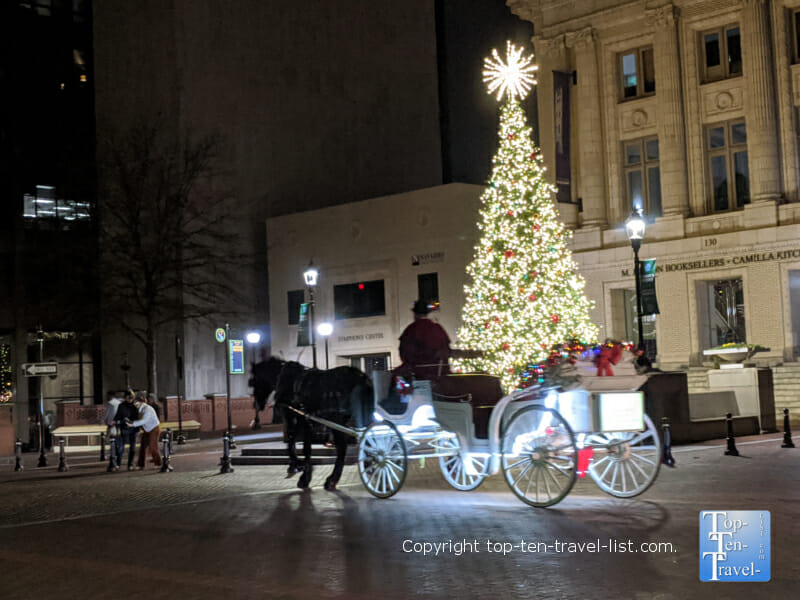

When decorating your South Carolina home for the holidays, it’s crucial to incorporate traditional colors that complement your home’s style. Don’t forget to adorn your fireplace with festive holiday hues as well. Discover more about Charleston’s holiday shopping options and the Christmas decorations found throughout the city.
Traditional holiday colors in South Carolina enhance the home’s aesthetic
The traditional holiday colors of red, green, and silver can add a touch of sparkle to a home. Marianne Harrison decorates her house in these colors. She uses heirloom silver to create a festive feel. She fills pitchers full of loose red roses and holds them in silver containers. Red paisley shawls dress the sofa, and tablecloths add flair. A festive swatch fabric placed over the back of an unattractive couch will add style and charm.
Traditional holiday colors can be enlivened with unexpected color combinations. Black accents can add sophistication to traditional holiday colors. Adding a fireplace garland with gold tones can also add holiday cheer to a South Carolina home. It doesn’t matter if you choose traditional colors or a more modern scheme, it’s always a good idea for your home to include the colors that bring joy.
Burgundy, while traditional colors like red or green can be festive, can add a new dimension. In fact, some of these colors can be quite warm. Blogger Lucy Akins chose burgundy to decorate her Christmas tree, while Michael Wurm Jr. selected cool-toned colors to make a tree in his apartment. He also sprinkled touches of gold throughout the tree.
Tips for decorating a fireplace
If you want to make your fireplace a focal point during the holiday season, consider decorating it with seasonal greenery. Place a beautiful Christmas tree in the center of the mantel. To add some festive flair, you can place a garland or wreath over the mantel. White LED lights are also a great option, especially if you want to add a touch of sparkle to your fireplace. You can also use a simple vase to reflect the light. Last but not least, you can add holiday spirit to your home by placing a rustic wreath above the mantel.
Make sure you read the manufacturer’s instructions regarding safe hanging distances before hanging decorations. A fireplace user’s guide will usually give information about the safe distance from which decorations can be hung. Stockings and Elf on the Shelf decorations should be avoided as they can melt or burn if placed too close to heat sources.
Keeping the fireplace away from flammables is another way to keep it safe. For this season, a healthy, fresh tree is the best, as old, dry trees pose a greater fire risk. Also, keep the fireplace at least three feet away from flammable objects and heat sources, including candles. Your fireplace’s manual should include information about the safe distances for Christmas trees and other objects.
For visual interest, you can use molding around the mantel if you don’t own built-ins. You should match the molding to the walls and choose a complementary color. To add character and interest to the mantel, you can choose a sunburst or other framed piece art. You can finish the look with matching candlesticks or figurines of deer.
Charleston holiday shopping
Traditional colors are a great way to decorate homes during the holiday season. Bright red and traditional holiday decorations will bring out holiday spirit. The colors red and green can also be combined to give a festive look to your home. Marianne Harrison, the owner of the Rhett House in Beaufort, uses these colours to decorate her home. To add sparkle to her home, she also uses heirloom-silver.
Another great idea is to make your fireplace the focal point of your room. To accent the fireplace, you can use simple decorations such as garlands. You can also install white LED lights to highlight the fireplace. To reflect the light, you can place a vase on top of the mantel. For holiday spirit, you can also place a rustic wreath above the mantel.
You can make a big impression on potential buyers by staging your home during the holiday season. Choosing holiday-themed decorations for your home will create a polished, but simple look. However, if you’re staging your home for sale, you don’t want to overdo the decorations because it will detract from the room itself. A white artificial tree with white LED lights is a great option. Make sure to use ornaments that coordinate with the lights that you’ve already installed. An ornament in silver or red will add color and sparkle.
Xmas decorations in Charleston
Christmas has long been a special time for Charlestonians. In the 17th century, enslaved people were often allowed a few days off to celebrate the holiday. They would attend religious services and be treated to special meals. Christmas was also a popular time to get married. European traditions such as Christmas trees and Father Christmas were also widely adopted by the town’s white residents.
Charleston is home to many historic buildings, which are especially stunning during the holiday season. Many of these buildings are decorated in holiday lights and other festive decorations. Historic homes, churches, and stores are beautifully decorated with lights and garland. Charleston’s Christmas decorations are a great choice if you love history and historic buildings. You can also take guided tours to enjoy the wonderful Christmas atmosphere.
The official tree lighting ceremony in Charleston is held at historic Marion Square. This event features a 60-foot Christmas tree and is free to attend. It is followed by a series of activities for children and live music. It is a great place to bring your family and friends and celebrate the holiday season.
There are many places where you can sing along to Christmas carols if you have a family who loves them. Every year, the Charleston Symphony Orchestra hosts a Holiday Pops. It features all your favorite Christmas songs. If you’re visiting Charleston during the holidays, Rudolf the Red-Nosed Reindeer will be performing.
If you’re traveling with children, make sure to see a holiday light show and visit many decorated houses. Another popular holiday event is the Charleston Holiday Festival. A holiday parade featuring music, floats and carolers is available to visitors. In addition to holiday light displays, there’s also a family-friendly holiday festival held at Charleston’s Volvo Car Stadium and Family Circle Tennis Center.
While you’re there, don’t miss the Charleston City Market. This historic area is home to many antique, fashion, and handmade shops. Charleston City Market offers more than just gift shops. It also has a wide variety of local restaurants and live entertainment. Many local restaurants offer holiday-themed discounts.
- About the Author
- Latest Posts
Introducing Charles, the Editor in Chief at ByRetreat, whose passion for interior design and editorial excellence elevates every remote workspace to new heights. With his keen eye for detail, impeccable taste, and expertise in design, Charles brings a wealth of knowledge and creativity to the ByRetreat team.
As the Editor in Chief of a renowned lifestyle blog, Charles has honed his skills in curating captivating content and staying up-to-date with the latest trends in interior design. His deep understanding of aesthetics and the power of storytelling through design enables him to create remote workspaces that are not only visually stunning but also rich in personality and meaning.
Architecture Home Styles
What Elements Define Mission Style?
Get ready to uncover the essence of Mission style furniture – where form, function, and philosophy intertwine in a captivating design narrative.
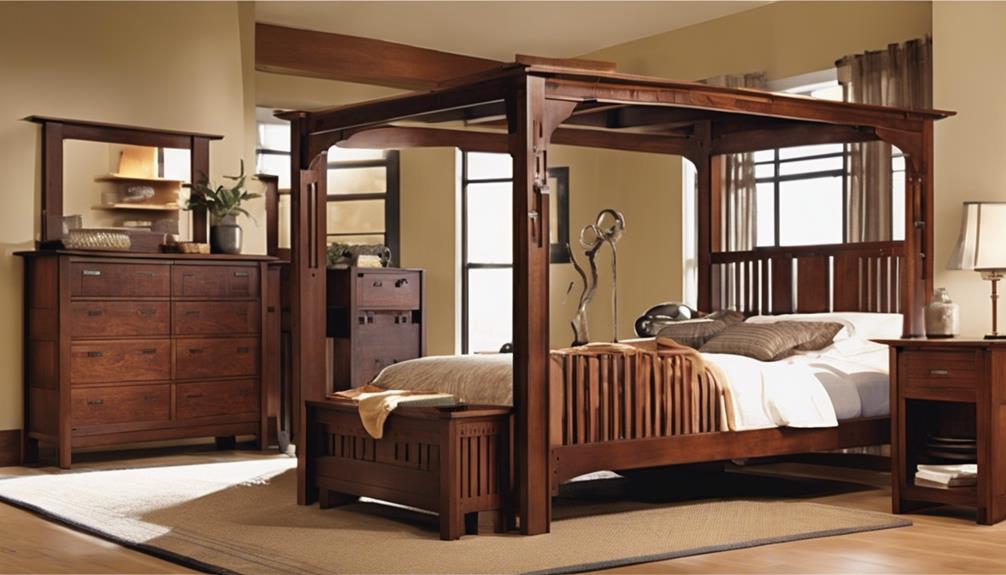
When it comes to defining Mission style, the elements are more than just a mere reflection of design; they embody a philosophy.
The fusion of form and function in Mission style furniture goes beyond mere aesthetics. By exploring the origins and influences, we uncover a rich tapestry of history and craftsmanship that continues to shape contemporary interpretations.
Join us as we unravel the intricate threads that make up the fabric of Mission style, revealing a timeless tradition that continues to captivate designers and enthusiasts alike.
Key Takeaways
- Clean lines and minimal ornamentation characterize Mission style furniture.
- Natural hardwoods like Oak and Cherry are prominent in Mission furniture construction.
- Exposed joints and precise craftsmanship highlight authenticity and structural integrity.
- Warm, earthy tones and traditional finishes define the timeless appeal of Mission style.
Origins and Influences
Crafting a response to Victorian excesses and mass-produced industrial furniture, we delve into the origins and influences of Mission style elements.
The Arts and Crafts movement, spearheaded by Gustav Stickley, played a pivotal role in shaping this style. Stickley aimed to uphold the values of individual craftsmanship and authenticity, countering the dehumanization brought about by mass production.
Drawing inspiration from Shaker style, Mission furniture embodies simplicity of design and a dedication to high-quality craftsmanship. This style marked a significant shift towards the celebration of artisanal workmanship, emphasizing the uniqueness and integrity of each piece.
Key Characteristics and Features
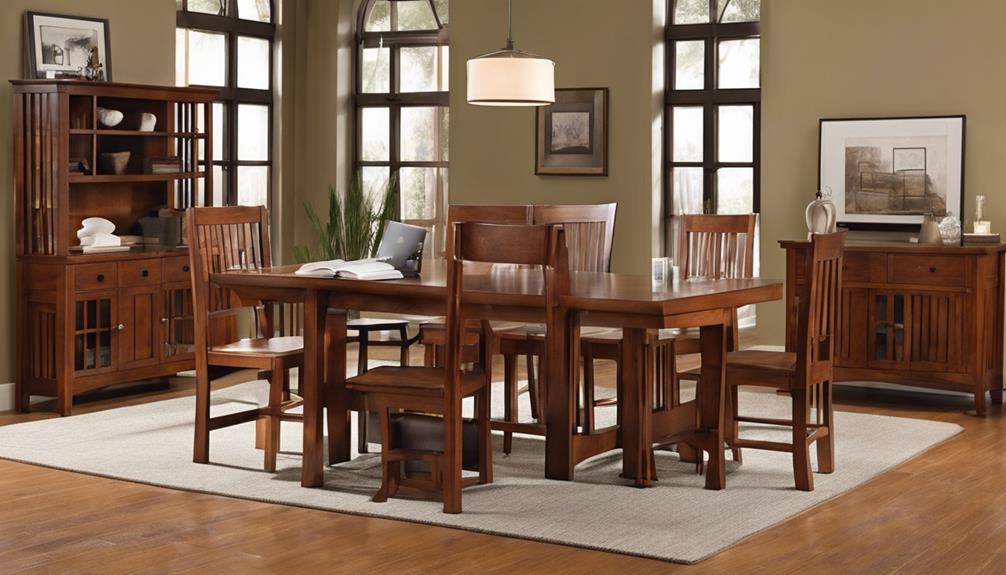
In exploring the essence of Mission style furniture, we encounter a design philosophy rooted in simplicity, precision craftsmanship, and a profound respect for natural materials. This style is characterized by:
- Clean Lines: Mission style furniture features simple horizontal and vertical lines, often with minimal ornamentation. The design focuses on straight edges and geometric shapes, giving a sense of balance and symmetry to the pieces.
- Natural Materials: Crafted primarily from hardwoods like Oak, Cherry, Walnut, and Maple, Mission furniture highlights the beauty and durability of wood. The emphasis on natural materials reflects a connection to the earth and a desire for authenticity in craftsmanship.
- Exposed Joints: Exemplifying precision and quality craftsmanship, exposed joinery is a common feature in Mission furniture. Visible joints not only add to the aesthetic appeal but also speak to the durability and structural integrity of the pieces.
Mission style furniture's timeless appeal lies in its marriage of form and function, where every element serves a purpose, celebrating the beauty of simplicity and the artistry of the craftsman.
Materials and Construction Techniques
Utilizing high-quality hardwoods such as Oak, Cherry, Walnut, and Maple, Mission style furniture exemplifies meticulous craftsmanship and durability through exposed mortise and tenon joints. The emphasis on natural grain and the precision required in crafting these pieces is evident in the vertical and horizontal lines that define Mission style furniture. The use of quality wood not only highlights the beauty of the material but also ensures the longevity of the pieces. The construction techniques in Mission style furniture focus on exposed joints, showcasing the skill of the craftspeople and reinforcing the sturdy nature of the furniture.
In Mission style furniture, there's a deliberate lack of embellishment, allowing the simple yet elegant design to speak for itself. The durable construction methods, including block style feet, contribute to the robust appearance of the furniture while maintaining a timeless aesthetic. Additionally, the choice of leather upholstery complements the traditional styling of Mission furniture, adding a touch of sophistication and ensuring longevity in both style and durability.
Colors and Finishes

Warm, earthy tones like golden oak, rich cherry, and deep walnut finishes are prominent features in Mission style furniture, reflecting a traditional and timeless aesthetic. When it comes to colors and finishes in Mission furniture, here are some key points to consider:
- Natural Wood Grain: Popular finishes in Mission style furniture often include medium to dark stains that enhance the natural beauty of wood grains, emphasizing the vertical and horizontal lines characteristic of Mission design.
- Traditional Hues: Mission style colors lean towards warm browns, reddish tones, and dark chocolates, creating a sense of richness and depth in the furniture pieces.
- Modern Interpretations: While traditional finishes like Mission Oak highlight the natural characteristics of the wood, modern interpretations may experiment with different finishes to adapt to contemporary tastes while still maintaining the essence of Mission style's cozy and inviting ambiance.
These color choices and finishes play a crucial role in defining the classic and enduring appeal of Mission style furniture.
Evolution and Contemporary Interpretations
The evolution of Mission style furniture has seen a shift towards incorporating modern materials like metal and glass while retaining its traditional design elements. Contemporary interpretations of Mission style furniture often focus on blending solid wood with metal or glass to create a modern sensibility and aesthetic. This fusion allows for a timeless look that appeals to a wide range of individuals seeking quality pieces with durability. By highlighting grain patterns and utilizing natural grains and characteristics of the wood, these pieces showcase the elegance and spare simplicity that define Mission style. The exposed joints in modern Mission furniture add a touch of authenticity, while the crisp lines and lack of ornate details provide a sense of sophistication. Quality wood means durability to any piece, ensuring that contemporary Mission style furniture is not only visually appealing but also built to last.
| Keywords | Description |
|---|---|
| Solid Wood Furniture | Provides durability and a classic look. |
| Natural Grains and Characteristics | Highlight the beauty of wood in each piece. |
| Crisp Lines and Lack of Ornate Details | Give a sophisticated and clean appearance. |
| Elegant and Spare Simplicity | Emphasizes a refined and uncluttered design. |
| Exposed Joints and Highlighted Grain Patterns | Add authenticity and visual interest to the furniture. |
Frequently Asked Questions
What Are the Elements of Mission Style?
When we explore the essence of Mission style, we uncover a design philosophy rooted in simplicity, craftsmanship, and functionality.
The hallmark elements of this style encompass a celebration of natural wood grain, clean horizontal and vertical lines, and exposed mortise-and-tenon joints, showcasing both durability and aesthetic beauty.
These characteristics are further accentuated by block-style feet, leather seatings, and a preference for hardwoods like Oak, Cherry, Walnut, and Maple, epitomizing timeless elegance.
What Defines Mission Style?
When we consider what defines Mission style, we focus on the simplicity of horizontal and vertical lines, limited ornamentation, and the emphasis on natural wood grain and exposed joinery.
This style showcases rectangular shapes, block-style feet, and leather seats on chairs. Crafted from hardwoods like Oak, Cherry, Walnut, and Maple, Mission furniture radiates timeless elegance with exposed pegs and minimal decorative elements as its defining features.
What Makes a Mission Style House?
When we think about what makes a mission style house, we focus on the distinctive features that give it its unique charm. Elements like terracotta tile roofs, white stucco exteriors, and intricate tile accents are key in defining this architectural style.
Additionally, stained wood accents, tile floors, and stone fireplaces create a warm and inviting atmosphere inside these homes. Quatrefoil windows, cast stone columns, and ornate iron stair railings further contribute to the timeless appeal of Mission style architecture.
What Is the Difference Between Craftsman and Mission Style?
When comparing Craftsman and Mission styles, it's crucial to note their distinct design features. Craftsman pieces often showcase decorative elements and curved lines, while Mission furniture focuses on straight lines and minimal ornamentation.
Craftsman style may incorporate intricate detailing, giving it a refined look, whereas Mission style emphasizes practical functionality and exposed joinery for a simpler, sturdier aesthetic. Both styles value craftsmanship and quality materials but offer unique characteristics that cater to different tastes.
Conclusion
In conclusion, the timeless beauty and functionality of mission style furniture are evident in its simple lines, natural materials, and exquisite craftsmanship.
Just like a well-crafted piece of mission furniture, this design aesthetic stands the test of time, blending traditional charm with modern appeal.
It's like a carefully constructed puzzle, each element fitting perfectly together to create a stunning and enduring work of art that will be cherished for generations to come.
- About the Author
- Latest Posts
Introducing Ron, the home decor aficionado at ByRetreat, whose passion for creating beautiful and inviting spaces is at the heart of his work. With his deep knowledge of home decor and his innate sense of style, Ron brings a wealth of expertise and a keen eye for detail to the ByRetreat team.
Ron’s love for home decor goes beyond aesthetics; he understands that our surroundings play a significant role in our overall well-being and productivity. With this in mind, Ron is dedicated to transforming remote workspaces into havens of comfort, functionality, and beauty.
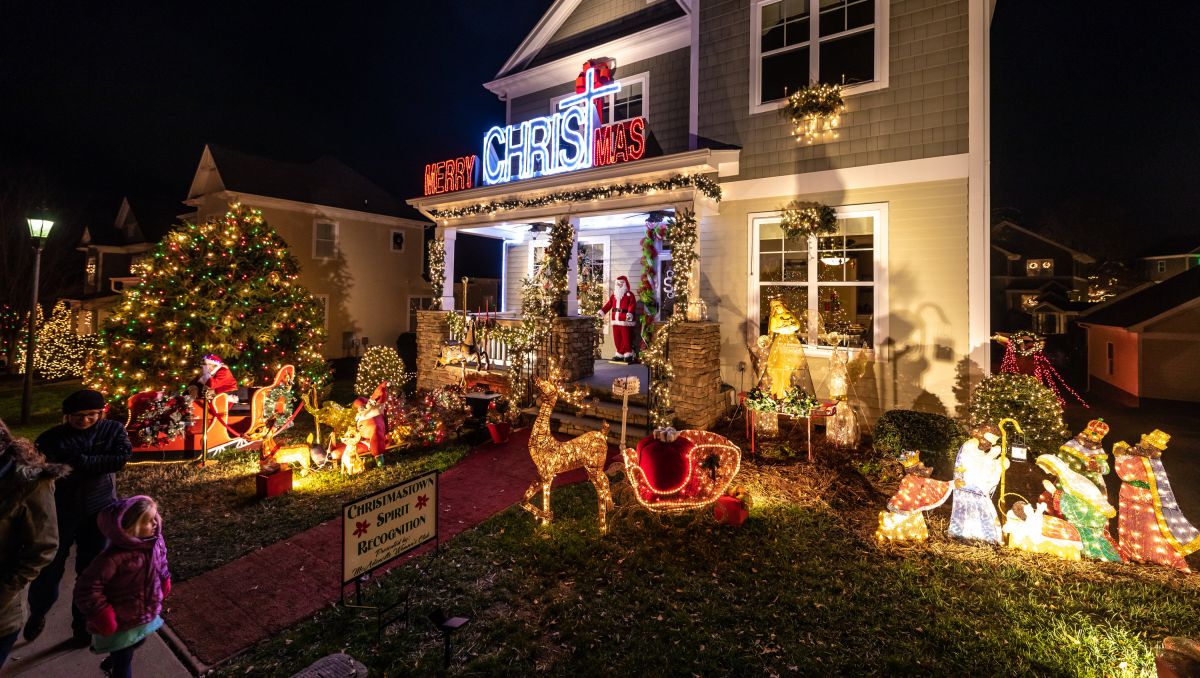

Christmas is a special time of year that is full of magic. The process of decorating your home for the holiday season can be quite thrilling. In North Carolina, there are numerous choices available for holiday decorations. Whether you are interested in adding a Pre-lit Christmas tree, Colorful garland and swags, or incorporating Colonial style decorations into your home, you will discover a wide range of options.
Pre-lit Christmas trees
Pre-lit Christmas trees are a great way to decorate your home for holidays. These trees are pre-strung and include 1200 LED lights in various colors. They are energy efficient and cool to the touch. The branches are hinged, so assembling them is a breeze.
Pre-lit trees are simple to put up and require little effort. This allows you to enjoy the holidays without worrying about tangled lights. You can also get one with color-changing lights that add vibrant pops of color to your tree. A Christmas tree skirt can be added to the design, along with additional decorations and lights. A large tree can be the focal point of your living space, while a smaller tree can add visual interest.
An unlit Fraser Fir Christmas tree is a better option for those who want a smaller tree. This tree comes with lush PVC branches that will not lose their color during winter. They are also flame-resistant so you can use them year after année.
When choosing a tree, be sure to consider the height and width of the space you plan to place it in. Full-sized trees typically measure around 7.5 feet in height, but smaller trees can be found for those with smaller floor spaces. You should allow six inches between the ceiling and the top of the tree when choosing a tree. Also, consider the size and height of any decorations you intend to place on it.
Colored garland
A color garland is a great way to decorate your home for the holidays. This festive decor can also be used to decorate your mailbox or door. You can buy fresh greenery and make your own garland for your mailbox. You can also add ornaments and pinecones to your mailbox. Add a festive bow to complete the look.
Colored garland can make your home festive and welcoming for Christmas. It’s also a beautiful way to decorate your tree. You can find all kinds of garland in the store or online. These garland pieces are available in a wide variety of colors and styles to match any interior or exterior.
Colored swags
Colored swags are a great way to add holiday cheer to your home. The swags can be used as decorative elements to accent your dining table, mantel, and even front porch. You can use a wide variety of colors, as well as any combination of ribbon and flowers, to create a personalized look for your home.
Colonial-style decorations
Colonial decorating is all about incorporating natural elements such as cranberries or hollyberries into your decor. For a festive touch, you can display dried hydrangea blooms. Faux ornaments can be used in place of real ones to ensure they don’t wilt or fade. A muslin cloth is a great choice to conceal the faux ornaments. You can also use burlap or twine to tie the garland around your tree.
Natural elements can also be used for decorating such as bricks, plants, or flowers. You can decorate your house with holiday-inspired accents by using magnolia, boxwood, or pine trees. You can also incorporate acorns and pinecones into your decor.
- About the Author
- Latest Posts
Introducing Charles, the Editor in Chief at ByRetreat, whose passion for interior design and editorial excellence elevates every remote workspace to new heights. With his keen eye for detail, impeccable taste, and expertise in design, Charles brings a wealth of knowledge and creativity to the ByRetreat team.
As the Editor in Chief of a renowned lifestyle blog, Charles has honed his skills in curating captivating content and staying up-to-date with the latest trends in interior design. His deep understanding of aesthetics and the power of storytelling through design enables him to create remote workspaces that are not only visually stunning but also rich in personality and meaning.
-
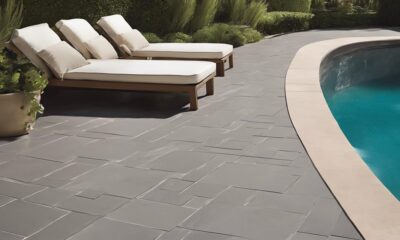
 Vetted3 days ago
Vetted3 days ago15 Best Tile Adhesives for Outdoor Use – Top Picks for Durable and Weather-Resistant Installations
-

 Beginners Guides18 hours ago
Beginners Guides18 hours agoAre Retreats Profitable
-
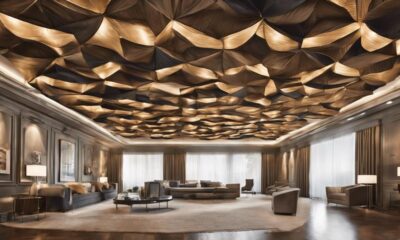
 Vetted2 days ago
Vetted2 days ago15 Creative Ways to Cover Up Popcorn Ceilings and Transform Your Space
-

 Vetted19 hours ago
Vetted19 hours ago15 Best Playroom Storage Solutions to Keep Your Kids' Space Organized and Fun
-
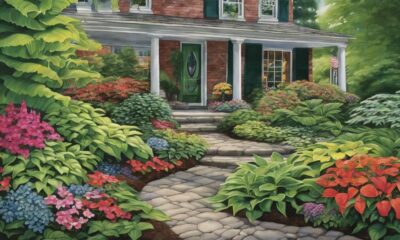
 Vetted4 days ago
Vetted4 days ago15 Best Plants to Thrive on the North Side of Your House – A Gardener's Guide
-
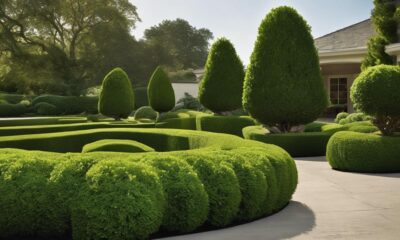
 Vetted2 weeks ago
Vetted2 weeks ago15 Best Boxwood Varieties for Thriving in Full Sunlight
-

 Vetted2 weeks ago
Vetted2 weeks ago15 Best Ways to Label Clothes for Nursing Home Residents – Stay Organized and Efficient
-
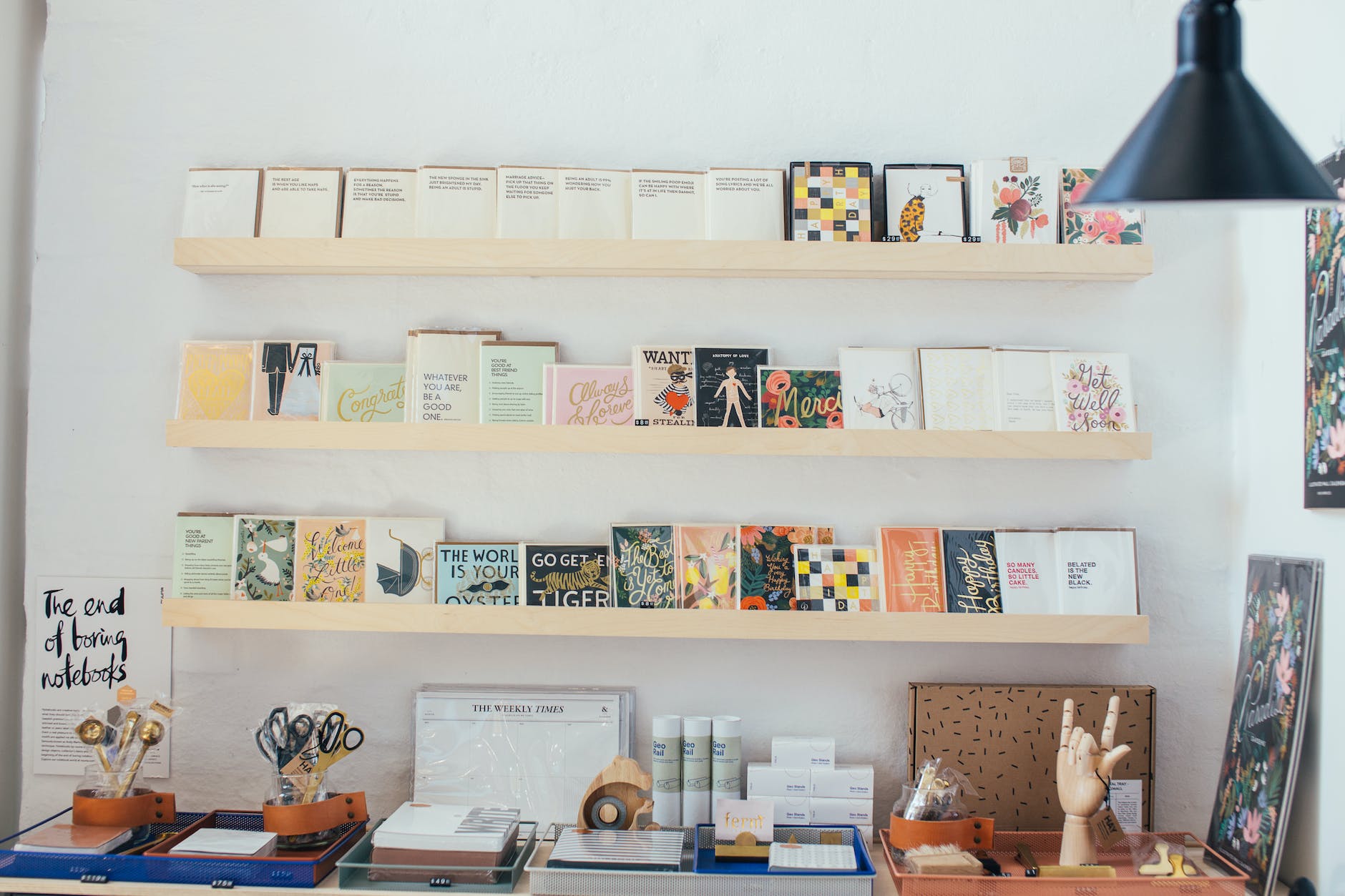
 Decor6 days ago
Decor6 days agoAre Home Decor Stores Profitable?










